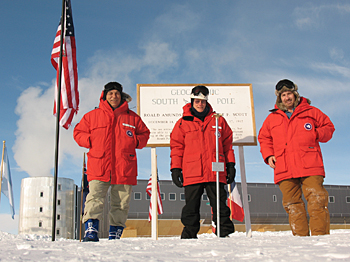
Hello from the South Pole
Their Antarctic blogs will appear on UDaily and on the Wilmington News Journal’s Delaware Online Web site through a partnership between UD and the newspaper.

Today is my second full working day at the South Pole. I'm getting used to the altitude (10,000 feet) and to the temperature (-40 degrees now). Actually, the weather isn't too bad when the sun is out and the wind is low and when you have the right clothes on. The right clothing is what all travelers to Antarctica working on projects sponsored by the National Science Foundation (NSF) get in Christchurch, New Zealand.
Christchurch is the gateway to Antarctica. Near the airport is an office of the NSF and a clothing distribution center where my long underwear, fleece underjacket, wind pants, parka, boots, gloves, and hats were issued. I traveled to Christchurch from Los Angeles with my colleague from UD, Stoyan Stoyanov. Our flight left LAX Sunday evening, November 4, and arrived, after 12 hours in New Zealand, on November 6, having crossed the international dateline.From Christchurch, the rest of the trip is by military aircraft, first five hours by C-17 to McMurdo and then, a day or two later, three hours to South Pole on one of the LC-130 Hercules cargo planes that the NY Air National Guard fly under contract to NSF. McMurdo is the base and jumping-off-point for the NSF Antarctic program (except the Palmer Peninsula). It has a population now of about 1100. The current population at Pole is 244, which fills up the new station as well as 12 “Jamesways” and 5 “hypertats.” I am lucky enough to have a room in the station. Stoyan and about 100 others sleep in the outbuildings about 500 yards away.
|
|
Our worksite for IceCube this year is almost a mile out. We hop a ride on a sled towed by one of the IceCube ski-mobiles to get out there. So far we managed to bring most of our tools and supplies out of storage from last season into the building we work in, which is part of the IceCube drill camp. We also dug out four freeze control units from our IceTop tanks this morning and brought them in to be refurbished. The high point of the day was the arrival of the passenger flight from McMurdo. Our colleague James Roth was on that flight, and you'll be hearing from him soon. We'll write about IceTop [http://icecube.bartol.udel.edu], IceCube [http://icecube.wisc.edu], and life at South Pole.
--Tom Gaisser, UD Research Team Leader

